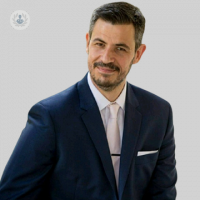Concussion: An expert guide
Written by:In this detailed guide to concussion, a mild form of traumatic brain injury, highly respected consultant neurologist Dr Ioannis Mavroudis explains the diagnostic procedure, the importance of rest and recovery and what to avoid following an injury of this type. The leading specialist also details how a traumatic brain injury or concussion affects a person’s risk of developing epilepsy in the following years.

How is concussion diagnosed?
A concussion is a mild traumatic brain injury. The diagnosis of concussion is clinical, and it is based on the symptoms. The diagnosis of concussion requires a temporary loss of normal brain function, which may result in brief loss of consciousness (less than thirty minutes), amnesia for less than twenty-four hours, confusion and disorientation, and/or dazedness. Additional tests, such as the ImPACT test can assist with the diagnosis and with better treatment planning and monitoring.
ImPACT test
The ImPACT test, is a widely recognised online test, used by experts and clinics for diagnosis, and monitoring of concussions. There are two different types of ImPACT test. The baseline test is used on high risk populations, such as athletes (professionals and amateurs), and army personnel at the beginning of the season. The post-injury test is done after a head injury and a suspected concussion. The post-injury test can assist with the diagnosis, prognosis and monitoring of a mild traumatic brain injury.
What is the main treatment for concussion?
Concussions do not require any treatment and usually resting at home and taking some time off work is enough. However, if the patient develops any post-concussion symptoms, additional medication, counselling, or physiotherapy may be required.
How long can it take for a concussion to heal?
The symptoms of concussion usually resolve within days or weeks, however, the aftermath may last for months or years. Data from the literature has shown that in the vast majority of cases, post-concussion symptoms resolve within four weeks to six months, however, in a small percentage of patients the symptoms may last for more than two years.
What should you not do after a concussion?
You should avoid driving, operating machinery or doing any exercise within the first twenty-four to forty-eight hours. If you have any persistent symptoms, such as headache, nausea, fatigue, brain fog, you should seek medical assistance.
What is the risk of epilepsy after a concussion or traumatic brain injury?
Mild traumatic brain injury is associated with a three-fold increased risk of epilepsy compared to normal population in the first year after such a head injury, falling to a two-fold elevation of risk in years one to four and finally to normal population levels of epilepsy risk at year five and onwards.
Risk factors for early post-traumatic epilepsy include younger age (especially in those under five years of age), focal neurologic deficits, depressed or linear skull fractures, and loss of consciousness or amnesia for over thirty minutes.
The risk of late post-traumatic seizures increases with age in patients over sixty-five. Additional risk factors include the presence of early post-traumatic seizures in adults, subdural haematoma, brain contusion, premorbid chronic alcoholism, penetrating head injury, retained metal fragments in the brain, depressed skull fracture, focal neurological deficits and the degree of loss of brain tissue as well as the severity of injury.
In terms of the cumulative incidence rates of late seizures over thirty years after a traumatic brain injury (TBI), in cases of mild injury the rate is two per cent, four per cent in moderate injuries and over fifteen per cent in severe injuries. The incidence is about five per cent in people hospitalised with a TBI. In the setting of severe head trauma with cortical injury and neurologic sequelae, the incidence of post-traumatic epilepsy (PTE) increases to over fifty per cent, particularly if the dura is penetrated.
Although late seizures often begin in the first few years following injury, they can occur much later. Approximately forty per cent begin during the first six months following injury and between fifty and sixty per cent within the first year. Around eighty per cent of first late seizures happen within two years of the injury. As time passes, the risk of incident late seizure lowers and is equivalent to that of the general population ten to fifteen years following the injury.
Dr Mavroudis is one of the UK’s leading consultant neurologists and specialists in concussion and traumatic brain injuries. If you wish to undertake a baseline, or a post-injury test or schedule a consultation with Dr Mavroudis, you can do so by visiting his Top Doctors profile.


